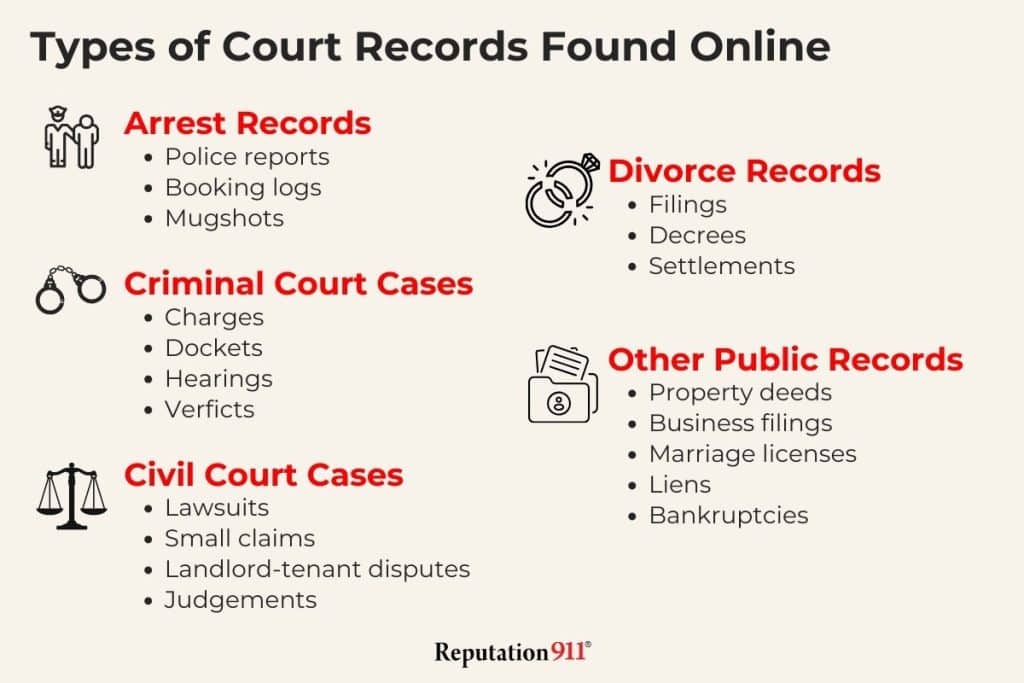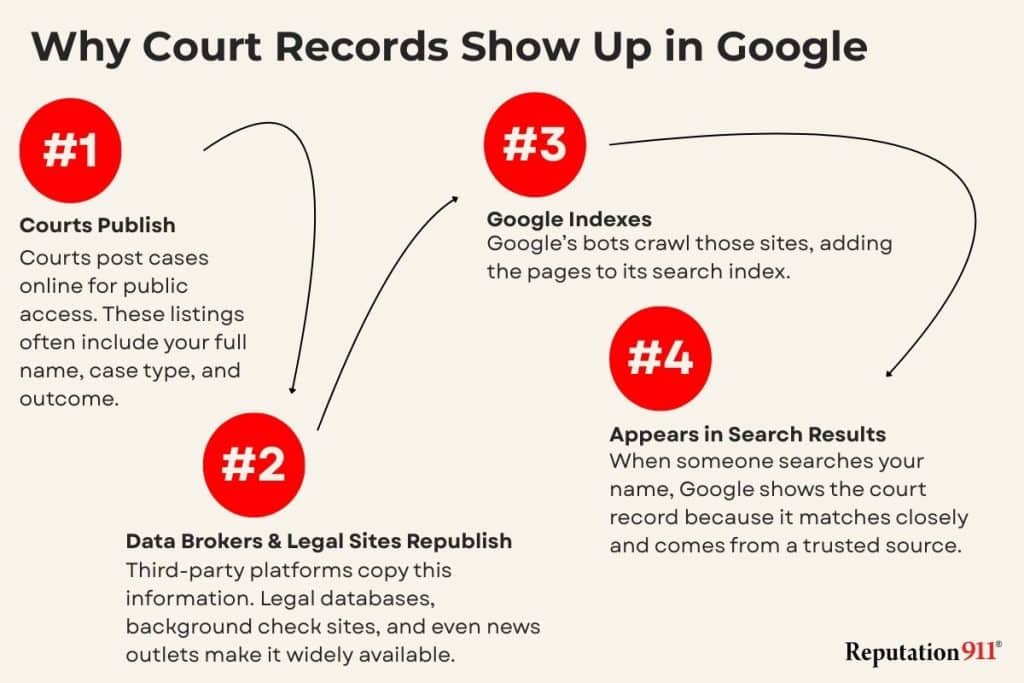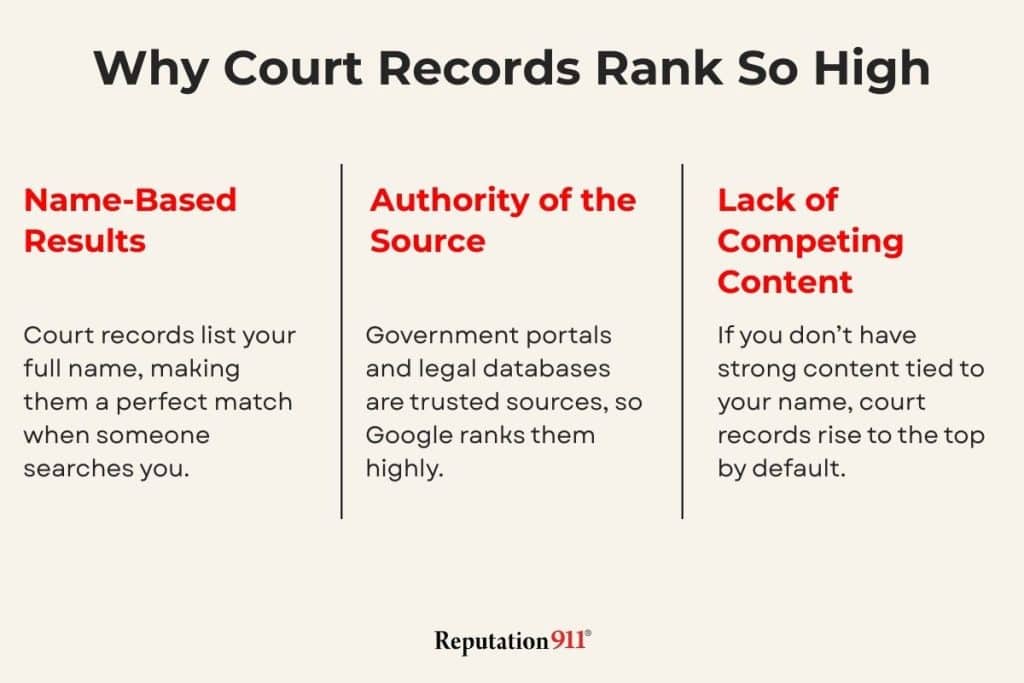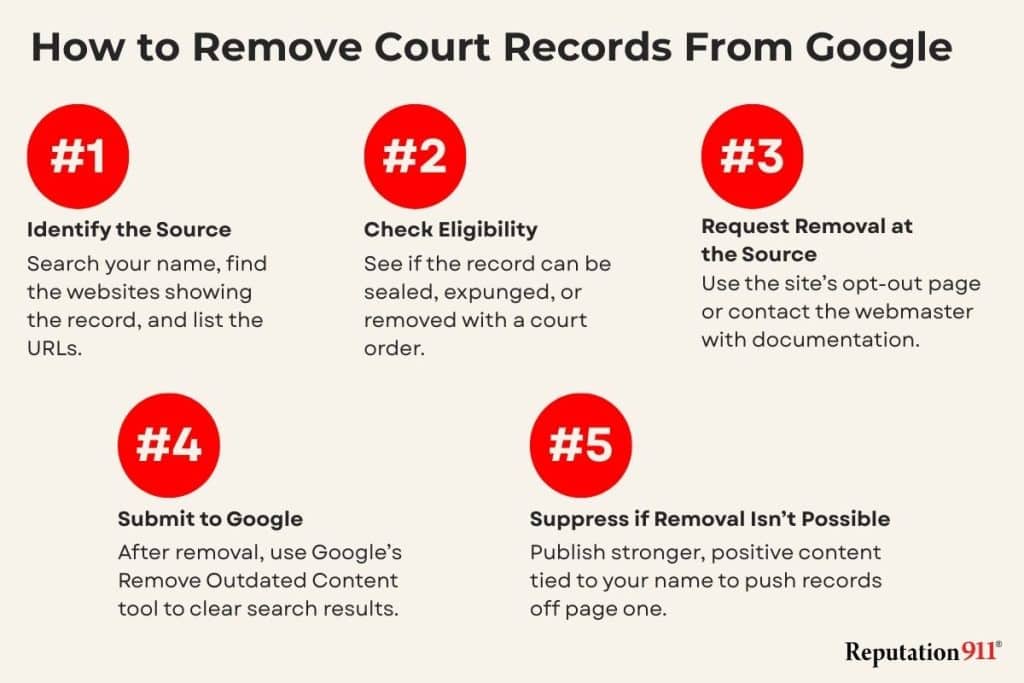Court records showing up in Google search results can seriously affect your personal and professional reputation. Even if a case was dismissed or resolved long ago, the information can linger online and feel like a violation of your privacy. Fortunately, there are actionable steps to remove court documents from online search results and reclaim control over how you or your business are perceived.
A court record showing up in your Google Search results can feel like a scarlet letter. Even if dismissed, the case still lingers on the internet for everyone to see.
It hurts job prospects, housing applications, and even personal relationships. One outdated link can overshadow everything else about you.
You’re not stuck. Court records can be removed at the source or suppressed from page one of Google Search. This guide explains how–and how our team can help you remove court cases from online search.
Google doesn’t host court records—it pulls them from court websites, legal databases, and data brokers. To remove them, you need to request removal at the source (through sealing, expungement, or a site’s opt-out process).
If removal isn’t possible, suppression is the next best option, pushing records off page one with stronger, optimized content. Reputation911 can help with both.
In this blog, you’ll learn:
Various legal documents and public records can appear online. Below are some of the most common types:

Arrest details often surface online even if charges are dropped later. These may include police reports, booking logs, mugshots, and basic arrest information.
Criminal case information usually includes charges, docket entries, court filings, hearings. And verdicts.
Civil disputes (such as lawsuits, small claims, or landlord-tenant judgements) often appear online.
Family court cases may reveal filings, decrees, or settlement documents. Even if the details are limited, the case itself can appear online.
Beyond criminal and civil matters, other official documents can surface in searches. These include property deeds, business filings, marriage licenses, probate documents, liens, and bankruptcies.
Often collected and displayed by data broker platforms and public record aggregators. You can learn more in our step-by-step guide to removing public records online.
If a course case shows up when you Google your name, it’s because the record is publicly available and Google has indexed it.

Court systems and legal databases use your full name as the main identifier in the record. That makes the page directly relevant to name-based searches. When someone types your name, Google sees the record as a strong match.
Court websites, government portals, and large legal databases have high domain authority. Google trusts them as reliable sources. Because of that, their pages often rank above personal sites, resumes, or social media profiles.
If you don’t have much online content tied to your name, Google has little else to show. A court record can easily take over page one simply because there isn’t stronger, optimized content to push it down.

The takeaway: Court records rank highly because they’re official, authoritative, and directly tied to your name. If possible, removal at the source is the best option to get them to stop showing up in your search results. If not, suppression strategies work by publishing stronger content that gives Google better results to display.
Court records in Google can damage your reputation even if the case was minor, dismissed, or resolved. Their presence alone can create bias and negative assumptions that affect every part of your life.
Employers routinely research candidates online. If they see a court case, they may question your reliability or trustworthiness, even if the case has no relevance to your skills. This bias makes it harder to land interviews or secure offers.
Learn more about how employers evaluate job seekers.
Landlords and property managers often check applicants online. A visible court record can raise concerns and block you from getting housing, regardless of your qualifications as a tenant.
Court records can influence personal relationships. About 50% of online daters search their matches online before meeting. If they see court details, it may lead to false assumptions and make building new connections harder.
Your online presence defines how others see you. Court records can overshadow your achievements and create a negative personal brand. For business owners, professionals, or public figures, this can erode client trust and even turn audiences against you.
Yes, but only under certain conditions. Google doesn’t host court records; it only shows them from other websites. To get them removed, you need proof that the record is no longer public.
If removal isn’t possible, search engine suppression is the next best option. By publishing and optimizing positive content tied to your name, you can push court records off page one of Google , where few people will ever look.
The experts at Reputation911 can help you remove or suppress content appearing in Google search results.
You can’t remove or suppress a court record from the internet until you know exactly where it’s published. Since Google only indexes content, the first step is to find the source website.
How to do it:
Court records often spread beyond official court portals. Once published, they’re copied by legal databases and data broker sites that rank highly in Google.
If your case appears online, chances are it’s listed on one or more of these platforms:
Secondary Sources (Re-publishers / Aggregators): These sites, including mugshot sites, news outlets, legal databases, and background check aggregators, republish records online and are often more flexible, with some allowing removals or opt-outs.
Category | Removal Likelihood | Details | Examples |
Primary Sources (Official Publishers) | |||
Court websites (county, state, federal) | ❌ Rarely removable, consider search suppression | Courts keep permanent records for transparency. Removal usually only happens if sealed/expunged. | Local/state court portals, PACER |
Government databases | ❌ Rarely removable, consider search suppression | State judiciary lookup tools and clerk systems usually won’t remove records unless sealed/expunged. | State judiciary case search, county clerk systems |
Law enforcement websites | ⚪ Sometimes removable | Some sheriffs/police remove old mugshots/arrests if charges are dropped; policies vary. | Sheriff inmate rosters, arrest logs, warrants |
Secondary Sources (Re-publishers / Aggregators) | |||
Mugshot sites | ⚪ Sometimes removable | Some allow removal if charges are dropped; many charge fees for takedown. | Mugshots.com, BustedMugshots.com, Jailbase.com |
News outlets | ⚪ Case-by-case | Local news may unpublish or de-index blotters; larger outlets rarely do. | Local newspapers, online police blotters |
Legal databases | ❌ Platform dependant: consider asking source to de-index, or search suppression | Pull from official feeds; won’t remove unless the original source is sealed. | Courtrecords.org, FindACase, Justia, FindLaw, Leagle, Casetext, Juralindex, Trellis Law, UniCourt, Docketbird, PACERMonitor, CourtListener, Plainsite, Law360 |
Background check sites | 🟢 Removable | All major data brokers offer opt-out processes (though data can reappear). | BeenVerified, TruthFinder, InstantCheckmate, Whitepages, Spokeo |
Not all court records are equal when it comes to removal or suppression. Some carry more weight in the legal system, which makes them harder to erase from the internet.
Appeals are harder to remove than trial records.
Trials deal mainly with the facts of a case, while appeals address points of law. Because of this, appeals are more valuable for legal research.
Attorneys, judges, and law students often reference appeal decisions, so databases like Justia or CourtListener keep them available for citation.
If your case has been cited in other opinions, it becomes even less likely to be taken down.
Federal cases are more difficult to remove than state cases.
Federal databases, especially official government sites like SEC.gov,are considered permanent public records. Without a court order, removal is nearly impossible.
Bottom Line: Appeals and federal cases carry more legal significance and are rarely removed from the internet. When these records appear in search results, suppression strategies are essential.
Not all court records can be taken down. You usually need a legal basis for removal. Before submitting requests, determine whether your case qualifies.
At this stage, many people work with an attorney to explore sealing or expungement. If that isn’t possible, a reputation management firm can guide you toward suppression strategies to reduce visibility.
If your court record qualifies, the most effective way to get it removed from search results is to remove it from the website hosting it. Once the source deletes the page, Google can’t index or display it.
How to request removal:
Keep in mind: even if one site removes your record, copies may remain on other platforms. That’s why tracking all URLs and ongoing monitoring is essential.
Once the source has removed your record, you can ask Google to clear it from search results. This ensures the deleted page no longer shows up when someone searches your name.
How to do it:
If the source page still exists, Google will not remove it. In that case, suppression is the next step.
If your record can’t be sealed, expunged, or removed at the source, suppression is the next best option. Suppression uses SEO to push court records off the first page of Google, where most people never look.
How suppression works:
With the right strategy, suppressed results lose almost all visibility. Our team at Reputation911 helps clients build these assets quickly to restore trust and control.
For more ideas, see our guide on burying negative Google search results.

Court records are not easy to erase. Legal protections and platform policies make removal difficult, and in many cases, suppression is the only realistic option.
Removing public court cases from Google can be a daunting task, but it is not impossible. By following these steps, you can take control of your online reputation and ensure that your records stay offline.
Remember, there are options available to you, even if you cannot remove your court case from Google. Negative search suppression is a great alternative that can help push down negative search results and boost positive ones.
In some cases, yes. Certain websites allow opt-outs or removals if you provide proof that your record was sealed, expunged, or dismissed. Others may refuse unless there’s a legal order in place.
Records that have been sealed, expunged, or covered by a court order are usually eligible for removal. Public and active cases are rarely removed unless they meet those conditions.
If removal isn’t possible, suppression is the next step. This means building stronger, positive content tied to your name to push court records off page one of Google.
Google doesn’t host or control court records–it only shows what exists on other sites. If the original page has been deleted or de-indexed, but is still appearing in search results, you can use Google’s Outdated Content Tool to clear the listing from search results faster.
Timelines depend on where the record is published and how it’s handled. If the website hosting the record agrees to remove it, search engines can take several weeks to update and fully de-index the page. You can request removal through Google’s tools to speed things up. Suppression strategies often show early movement, but it can take a few months to fully push court listings off page one of Google.
Legal platforms usually don’t charge for removing sealed or expunged records–but some, like DocketBird, offer paid expedited removal requests. Others may charge fees for de-indexing requests. If your court records appear on multiple sites, these fees add up, and removal isn’t always possible. For professional court records removal and suppression services, call us for a custom quote.
Yes—under certain circumstances, a lawyer can assist with court record removal. If your case qualifies for sealing or expungement, a criminal defense or expungement attorney can file the necessary motions to restrict public access. Once a record is sealed or expunged, it becomes much easier to submit successful removal requests to court record websites and search engines.
Yes. We start by reviewing where your court records appear and filing removal requests with the websites hosting them when possible. If a site won’t take the record down, we use search suppression to push those listings off the first page of Google. Suppression is especially effective when court records appear on multiple sites, since it can reduce the visibility of all of them at once.